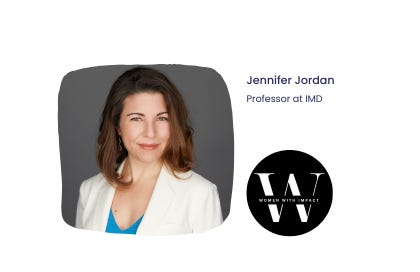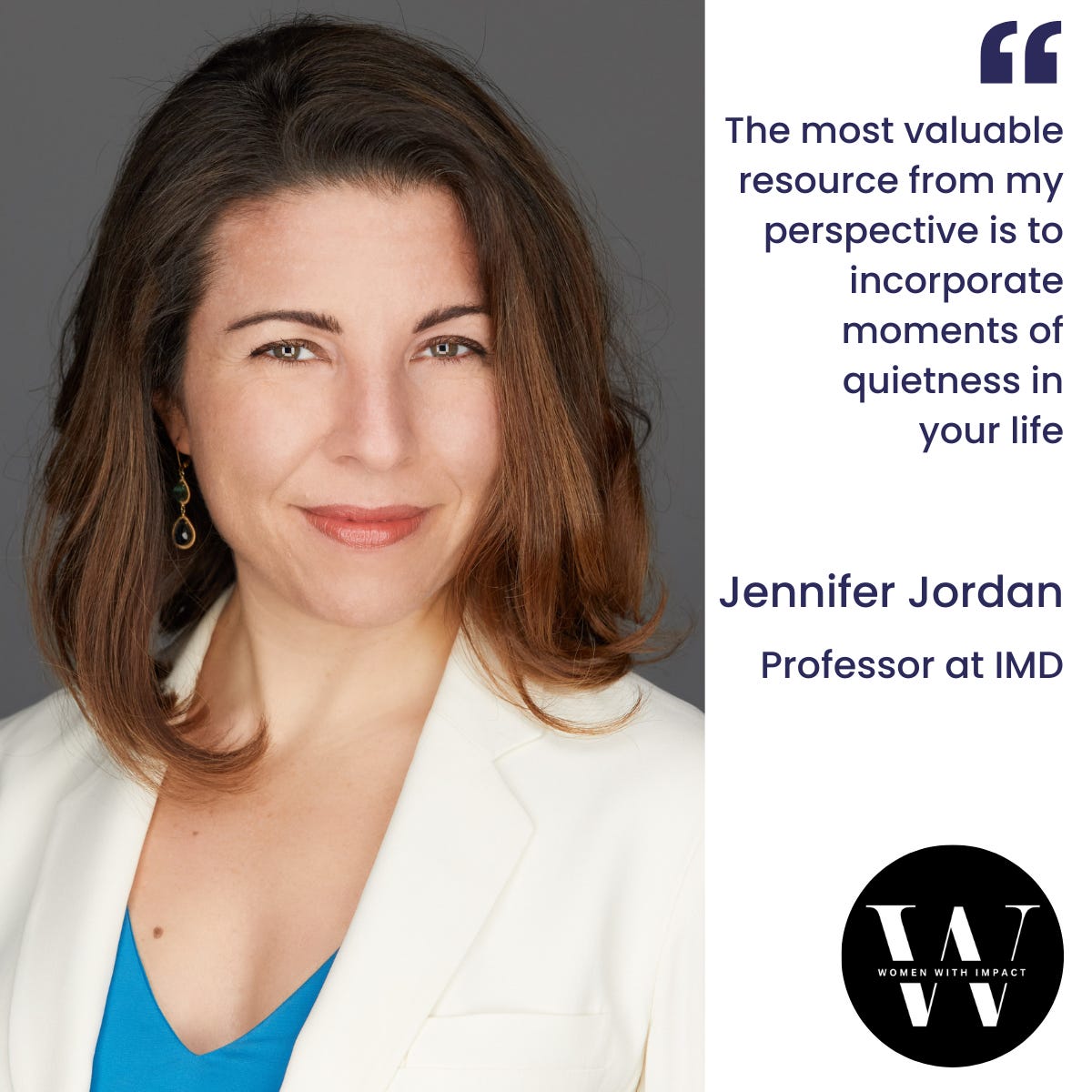Women With Impact #43 - Jennifer Jordan
Welcome to Women With Impact, a newsletter all about the journeys of mission-driven women and how they have a positive impact in our world.
I’m Clara Richter and this is the 43rd edition of Women With Impact. If you enjoy this issue, please share it with a friend and like it above.
For this edition, I interviewed Prof. Jennifer Jordan, Professor at IMD for Leadership and Organisational Behaviour. At IMD, she leads different programmes on leadership, including Women on Boards program. Prior to IMD, she was an associate professor and Rosalind Franklin Fellow at the University of Groningen and a Post-Doctoral Fellow at the Kellogg School of Management and Tuck School of Business. Jennifer did her studies at Yale University and Arizona State University. Her research in leadership, ethics, digital transformation and power has been published in numerous scientific journals and her work cited close to 1.5k time by other academics globally. In 2019, Jennifer has been named as one of the top 40 international business school professors under 40 years old.
Wishing you a pleasant read!
Best,
Clara
If you're reading this outside your inbox, subscribe to receive future editions directly here.
The Journey
Who are you and how do you most spend your time?
I am Jennifer Jordan and a Professor, Wife, Mother, Daughter and Friend. I would say I spend my time mostly in a balance between my family and working. Although I probably spend currently more waking hours at work. Every minute I am not at work, I spend it with my family.
You are an eminent Professor of Leadership and Organisational Behaviour at IMD. Could you share with us about your academic focus and what your journey was in a becoming a Professor in that field?
When I was 15 years old, I took a class on social psychology from Robert Cialdini, a very famous researcher in the US in the field of psychology. He is an expert on influence, and by the second class I took, I knew that I wanted to work in the field for the rest of my life. It’s very fulfilling to me to know that the goal I set myself at 15 is the one that I ultimately attained - especially since most people do not get to follow the career dream they set when they were still a child.
As for my choice of academic area, I chose to study Wisdom for my graduate studies. The curriculum comprised answering questions like “What is wisdom?” “How does wisdom over a lifetime evolve?”. I was very curious about the fact that analytical intelligence grows in individuals until they are about 24 years old, then plateaus, and starts declining at the age of about 50. This phenomenon led me to choose this study area. I wanted to see if there was a part of intelligence that grows as we age. At the time, the big business scandals in the US were erupting, such as Enron and Worldcom. I asked myself repeatedly why very smart individuals in these companies were making the choices they made, which eventually led to the companies destructions and imprisonment of the leaders. Ethics was a big part of my studies, so essentially, I researched the intersection between psychology and ethics. In this context, my interest in leadership and power, also came about.
You have been at IMD for around 8 years and recently developed a programme for aspiring women to become board members, called “Women on Boards”. Why is there the need for a separate board programme for women?
I developed the programme as it serves the overall goal in my career as a professor in leadership at a top institution to give women a voice in business and the world.
The purpose of the programme is two-fold: first, to get women on the board of companies, and second, to be successful once they are on the board of an organisation. What we especially focus on are the dynamics that are unique for women, which they need to be aware of, when navigating this field, like psychological dynamics, feelings of impostorism and interpersonal dynamics. In the programme, we aim to answer questions like:
"What unique dynamics arise when you are the only or one of a few women in the board?”
“How to counter stereotypes, like being on the board as a ‘quota woman’ and how to add your unique value to the board?”
“How can women use the push for more women on boards to their advantage?”
When designing the programme, it was always important to ask myself questions like: “What is unique for women when it comes to board positions?” and “What might be challenges they would face because they are women?” But also, “What are the unique opportunities?”
What’s a recent success you are proud of?
The fact that the “Women on Boards” programme in its first edition this year went so well, is a big success for me. Another that comes to mind is my work on the key tensions every leader must balance, which was published in Harvard Business Review (Video “7 Key Tensions Every Leader Must Balance”, Article “Finding the Right Balance — and Flexibility — in Your Leadership Style”, Article “Every Leader Needs to Navigate These 7 Tensions”). I researched leadership styles and highlight the importance in how executives need to be able to balance different styles. Two of the seven examined tensions include for instance “power holder” vs “power sharer”, and “tactician” vs “visionary”, and I highlight the significance in knowing which ones you tend to live and when the other spectrum might be relevant to use.
The Lessons
What is the most rewarding experience you have had to date in your journey in academia?
I think the fact that I am still here: it is quite a competitive field, and it is hard to succeed both as a researcher and someone who is more practictioner-oriented. Having gone through the traditional academic track, gaining tenure on the one side, and on the other to transition and contributing to a more practice-oriented view, is what I feel is most rewarding.
Talking about practitioning, next to your work at IMD, you are also on a board. Could you share more about your work there?
I am on the board of a privately owned company, and what I value very much is to see first-hand, what the challenges that the company and the CEO are facing. I appreciate reflecting on and observering how the board can and does support the CEO, as well as to witness what works well on boards and what does not – and to be part of improving the dynamics.
For me it’s about looking at the holding and its daughter-companies from a cultural angle, which I think, is frankly the hardest one. When you are not operationally working in the various holdings of the company, how would you judge the culture of the companies? My responsibility is to ask questions that get at this cultural angle, and then empower the CEOs to also reflect on elements of it.
What experience in your life have you most grown from?
Being a parent for sure, as it changed me in every way imaginable. One thing I would like to mention that changed me most, is my view of authenticity and values. After having children, I learned that some of the values I stood for did not serve them and needed to be revised. As an example, I am someone who deeply values efficiency and productivity. But children are not efficient in any way and they don’t want to be; when going from point A to point B, they first might want to share a dream they had last night, or chase a butterfly, which means the journey might take three times as long as initially thought. I used to get frustrated about such situations and rush my children, but then I realised that they need something different from me. They need me to be inefficient, which might also mean being inauthentic at times. This experience really changed my idea about authenticity and opened reflection about the importance of sincerity over authenticity. My team, my family, or the world around me might need different things from me at different times than I necessarily want to give. So, I’ve learned how to sometimes value sincerity over authenticity.
The Inspiration
What resource do you think people should make most use of?
I would say quiet. In a world where there is so much noise and where you can always get digitally distracted, I believe having a space for quietness and stillness can be so valuable. The most valuable resource from my perspective is to incorporate moments of quietness in your life. Even if you have so many things to do and on your agenda, knowing when you need a break and take a minute to breathe is so precious.
Enjoyed this or have any feedback? Let me know in the comments!
If you know someone who fits my mission and should absolutely be featured on Women With Impact, please nominate them here.




